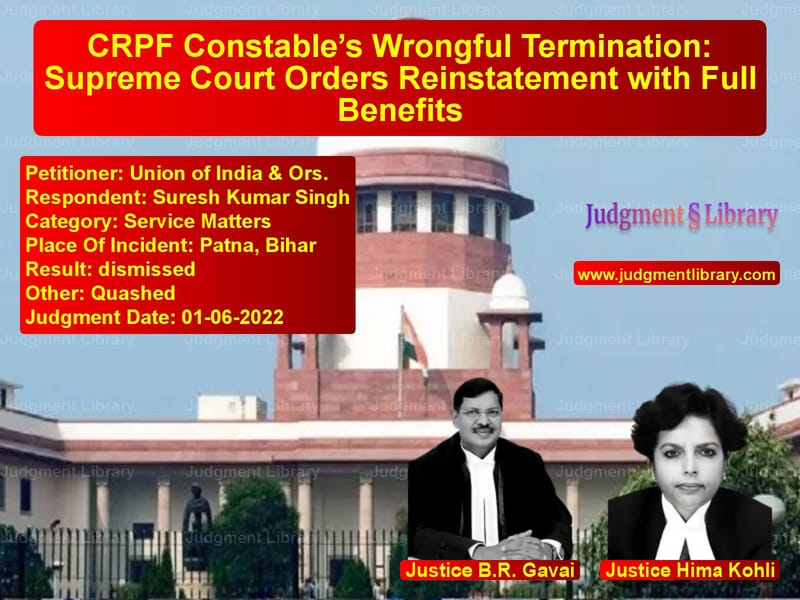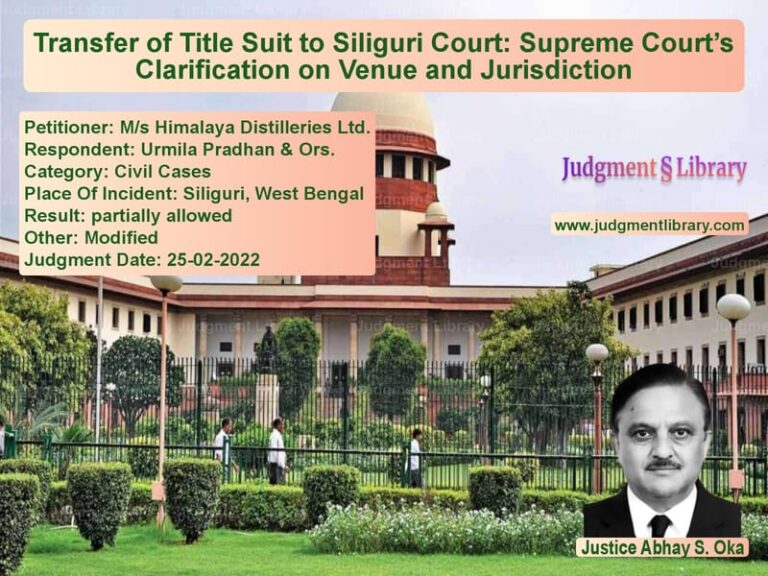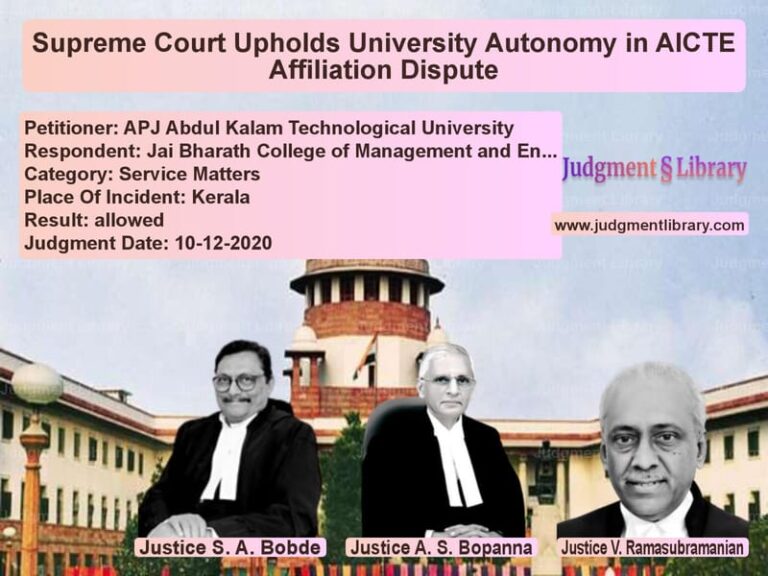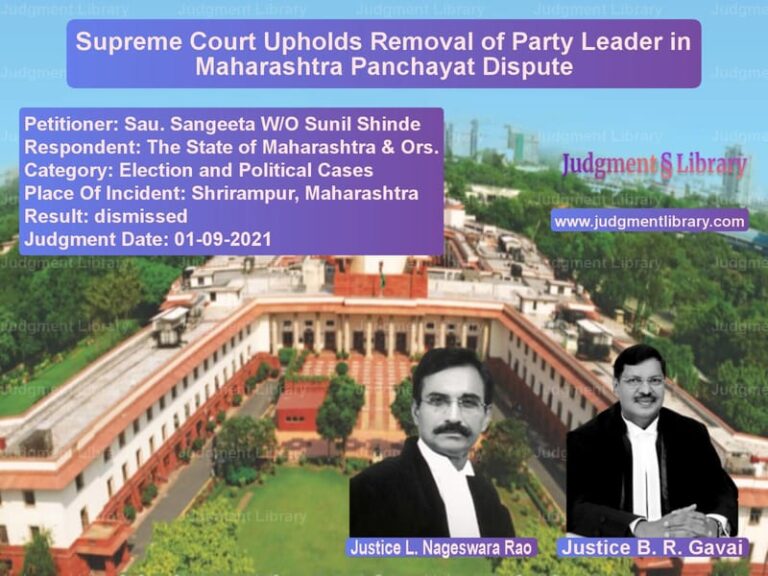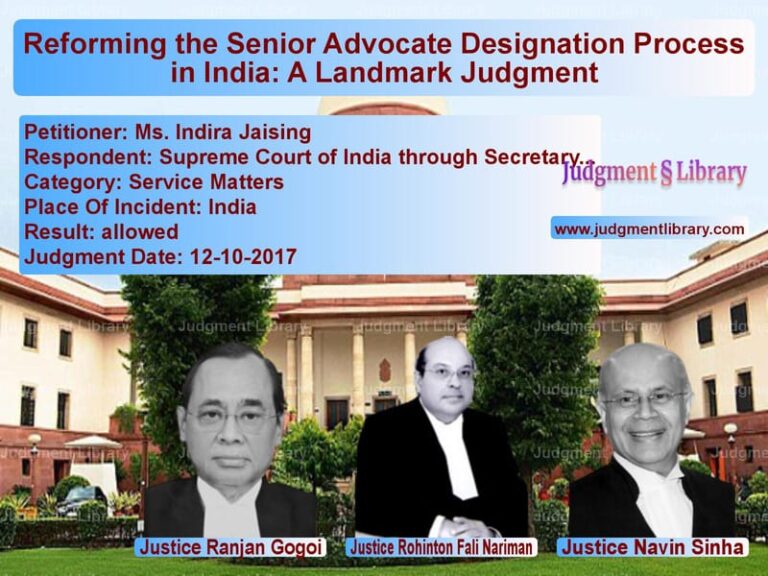CRPF Constable’s Wrongful Termination: Supreme Court Orders Reinstatement with Full Benefits
The Supreme Court of India, in the case of Union of India & Ors. v. Suresh Kumar Singh, delivered a significant ruling addressing the wrongful termination of a CRPF constable. The apex court dismissed the Union of India’s appeal and upheld the High Court’s decision to reinstate the respondent with full arrears and benefits. This case underscores the importance of conducting fair departmental inquiries and ensuring that essential witnesses are examined before imposing penalties on employees.
Background of the Case
The case revolved around the wrongful termination of Suresh Kumar Singh, a constable in the Central Reserve Police Force (CRPF). Departmental proceedings were initiated against him on allegations of misconduct under Section 11(1) of the CRPF Act, 1949. The primary allegation was that he exerted political pressure to cancel his transfer order. The authorities claimed that Singh, along with another constable, impersonated a Member of Parliament over the phone to influence senior CRPF officers regarding his transfer.
The key events in the case included:
- October 11, 1999: Charges of misconduct were communicated to the respondent.
- 2000: Alleged impersonation of a Member of Parliament to influence transfer decisions.
- First Inquiry: The inquiry found him guilty, leading to removal from service.
- First Appeal: The Appellate Authority found procedural lapses and ordered a fresh inquiry.
- Second Inquiry: The same findings were reached, but the penalty was reduced to 28 days of confinement with forfeiture of pay.
- Revisional Authority: The respondent’s revision petition was dismissed.
- January 28, 2010: The Patna High Court quashed the punishment, ordering full reinstatement.
- March 14, 2011: The Division Bench upheld the Single Judge’s order.
- June 1, 2022: The Supreme Court dismissed the Union of India’s appeal.
Petitioner’s Arguments
The Union of India, representing CRPF, argued that:
- The departmental inquiry had found the respondent guilty, justifying his removal.
- The High Court overstepped its jurisdiction by interfering with a disciplinary proceeding.
- The punishment imposed was within the discretionary powers of the disciplinary authority.
- Judicial review of disciplinary actions should be limited unless a fundamental procedural error occurred.
Respondent’s Arguments
Suresh Kumar Singh contended that:
- The inquiry was procedurally flawed as key witnesses, including the Additional DIGP and the STD booth owner, were not examined.
- The High Court had correctly applied the principles of natural justice in setting aside the punishment.
- There was no substantive evidence to prove the charges beyond doubt.
- The proceedings were biased and violated Article 311 of the Constitution, which protects civil servants from arbitrary dismissal.
Key Observations of the Supreme Court
The Supreme Court ruled in favor of the respondent and upheld the High Court’s judgment. The Court observed:
“In the absence of examination of key witnesses, the charges remain unsubstantiated. The principles of natural justice demand that a fair opportunity be given before penalizing an employee.”
The Court also emphasized:
- The inquiry was fatally flawed as critical witnesses were not examined.
- The respondent was deprived of his legal entitlements for over a decade.
- The High Court’s decision was justified and required no interference.
- The absence of key witnesses undermined the credibility of the disciplinary proceedings.
Final Judgment and Directions
The Supreme Court ruled as follows:
- The appeal was dismissed.
- The High Court’s order directing full reinstatement was upheld.
- The Union of India was ordered to clear all arrears and dues within three months.
- The respondent was entitled to consequential benefits, including seniority and promotions lost due to wrongful dismissal.
Conclusion
This ruling reinforces the necessity of fair departmental proceedings and adherence to natural justice. The judgment serves as a reminder to government authorities to conduct inquiries with due diligence and ensure that employees are not wrongfully penalized due to procedural lapses.
By holding that an inquiry lacking crucial witness testimony cannot stand, the Court has emphasized the fundamental legal principle that justice must not only be done but must also be seen to be done. The decision will serve as a precedent for future disciplinary proceedings involving public sector employees.
Petitioner Name: Union of India & Ors..Respondent Name: Suresh Kumar Singh.Judgment By: Justice B.R. Gavai, Justice Hima Kohli.Place Of Incident: Patna, Bihar.Judgment Date: 01-06-2022.
Don’t miss out on the full details! Download the complete judgment in PDF format below and gain valuable insights instantly!
Download Judgment: union-of-india-&-ors-vs-suresh-kumar-singh-supreme-court-of-india-judgment-dated-01-06-2022.pdf
Directly Download Judgment: Directly download this Judgment
See all petitions in Termination Cases
See all petitions in Disciplinary Proceedings
See all petitions in Public Sector Employees
See all petitions in Judgment by B R Gavai
See all petitions in Judgment by Hima Kohli
See all petitions in dismissed
See all petitions in Quashed
See all petitions in supreme court of India judgments June 2022
See all petitions in 2022 judgments
See all posts in Service Matters Category
See all allowed petitions in Service Matters Category
See all Dismissed petitions in Service Matters Category
See all partially allowed petitions in Service Matters Category

